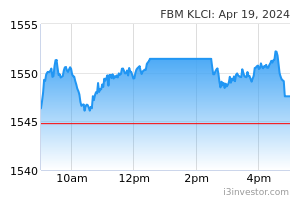Duopharma looking to ride out the storm

DUOPHARMA Biotech Bhd, which falls under the “essential services” category, was among the small group of companies that were given the leeway to operate during the Movement Control Order (MCO) period. But while the pharmaceutical company has not seen any impact in terms of operations, it does not expect to be spared from the impact of the MCO and the Covid-19 pandemic.
As the company relies heavily on imported raw materials, its main concern now is how exchange rate volatility and supply chain disruption could affect the company, says Duopharma managing director Leonard Ariff Abdul Shatar in an email to The Edge.
Leonard says while there is softness in demand from the private sector for medicine, public sector demand continues to meet expectations.
Duopharma’s customer base is well distributed, with 49% coming from the government sector, 43% from the private sector and the remaining 8% from exports.
Leonard is unable to share what the second half of 2020 will look like for the company at this juncture until it has better visibility on the economic direction as the nation comes out of the MCO.
“The pandemic has caused huge uncertainty in the business environment. Consumers are more cautious in their spending. The outbreak has also resulted in a disruption of the global supply chain as many countries have also closed their borders, which inadvertently heightens challenges in conducting business activities.
“This has dampened the global economic outlook, made worse by plummeting oil prices. Malaysia’s trade deficit will lead to a wider 2020 Budget deficit, [as calculations were] premised on oil price at US$60 per barrel and a relatively stronger exchange rate. This will put pressure on the ringgit and is detrimental to an importer like Duopharma,” explains Leonard.
He adds that he foresees 2020 to be a challenging year for the company but he remains “cautiously optimistic” about Duopharma’s 2020 financial performance.
To date, the ringgit has depreciated against the US dollar by some 6%, and the exchange rate ranged from 4.03 to 4.34 last Wednesday.
It is worth noting that 50% of Duopharma’s raw materials are transacted in US dollars, according to CGS-CIMB Research in a May 18 report.
The research house foresees Duopharma’s margins to be negatively affected in the short term because of higher raw material costs from the weakening ringgit, higher logistics costs and supply disruption in key supplying countries — China and India.
“In our view, Duopharma will face difficulty in raising its products’ selling prices, particularly for government orders as selling prices are typically locked in for one to two years,” notes the report.
Duopharma’s contract periods for the supply of pharmaceutical and non-pharmaceutical products to public hospitals and clinics have been extended for 25 months, from Dec 1, 2019 to Dec 31, 2021.
Leonard says the additional budget allocated to the Ministry of Health (MOH) because of the Covid-19 pandemic is for the overall requirements of the ministry and not restricted only to Covid-19. Hence, the company has seen increased orders for some products. These include drugs for chronic diseases such as cardiovascular ailments and diabetes.
Duopharma is not directly involved in the production of any Covid-19-related pharmaceuticals, but its vitamin C sales under the Flavettes and Champs brands have seen much improvement in the wake of the pandemic. RHB Research says in its May 19 report that vitamin C sales have spiked in the US, China and Japan.
“Some consumers will drop off [from vitamin C consumption], but we foresee that a higher proportion of consumers will continue taking supplements, especially vitamin C, to boost their body’s immune system. Consumers today are well exposed and aware of what they should do to boost their body’s immunity, hence we expect the trend [of higher vitamin C sales] to continue,” says Leonard.
RHB Research points out that Duopharma is a market leader in vitamin C products through its Flavettes and Champs brands. Historically, vitamin C sales have accounted for 10% to 15% of Duopharma’s total sales.
Leonard believes Duopharma’s vitamin C products in the consumer healthcare space will drive growth for the company. This year, it will be expanding its Flavettes range, he says, adding that the brand has the largest market share in the adult vitamin C space.
Besides that, he also expects the company’s analgesic brand Uphamol to show higher growth this year because of its higher investment in consumer awareness and engagement activities.
Leonard says Duopharma is cognisant of the challenges ahead with the disruption of supply chains and volatile foreign exchange rates. However, the increased allocation given to MOH augurs well for the company as 50% of its revenue is derived from the public sector. Meanwhile, growing consumer awareness of products such as vitamins and supplements should also bode well for the pharmaceutical company.
“We are positive on both the government and consumer healthcare spending trend that we are seeing, but cautious as well, as this may be temporary, and any post-pandemic effect needs to be managed,” says Leonard.
For the first quarter ended March 31, Duopharma recorded a net profit of RM13.56 million, down 6.2% from RM14.47 million a year ago. Revenue was higher by 5.5% at RM158.71 million, from RM150.39 million previously.
Currently, there are three “buy” and two “hold” calls on the company. The average target price is RM1.87. Last Wednesday, the counter closed at RM1.70, putting its market capitalisation at RM1.16 billion.
( 24,36 % )
( 39,38 % )
( 36,26 % )


